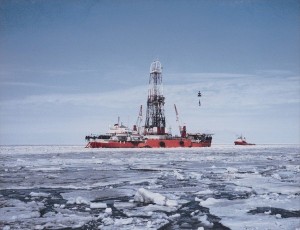The increased focus on oil and gas exploration in the Arctic has identified numerous issues. Oil and gas exploration is a significant challenge for policy makers at all levels of government. In the recent Review of Shell’s 2012 Alaska Offshore Oil and Gas Exploration Program, the Department of Interior identified seven critical principles for safe and responsible offshore drilling, including improved management of contractors and integrated government oversight.
It has been noted that with the substantial oil and gas resources believed to exist in the Arctic, geopolitical considerations will greatly impact domestic policy. A Center for Climate and Energy Solutions study found that “increasing accessibility to Arctic resources because of climate change, along with a growing and increasingly modern military presence of strategic rivals in the region, becomes a recipe for competition and potential conflict”.
Carol Browner and John Podesta, of the Center for American Progress, wrote an Op-ed detailing their change of heart regarding offshore drilling. They were originally open to the idea, provided “oil companies and the government could impose adequate safeguards, ensure sufficient response capacity and develop a deeper understanding of how oil behaves in ice and freezing water”. They now oppose Arctic Drilling, citing Shell’s difficulties as proof that these resources cannot be extracted safely.
Should The Administration issue new permits to Shell for 2013? What are the pertinent energy/environmental security issues and what conditions or requirements should be set?
